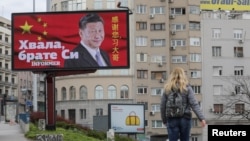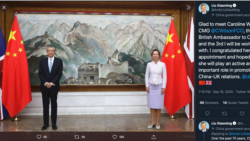China’s ruling Communist Party has found a new way to shape public opinion around the world: Western social media.
Not long after taking power in 2013, Chinese President Xi Jinping called it “the main battlefield” for public opinion. He added that winning the battle was related to the country’s ideological and political security.
Websites like Twitter and Facebook are banned in China. However, they have become a path for the Chinese government to share its messages with the world. And many of the accounts have been found to be set up under false names.
Liu Xiaoming is a former ambassador from China to Britain. He joined Twitter in October 2019 along with many other Chinese diplomats.
Liu has gained 119,000 followers since October. He is an example of China’s “wolf warrior” diplomats who aggressively fight anti-Chinese critics. His posts were retweeted more than 43,000 times from June through February alone.
But much of the popular support Liu and many other Chinese officials seem to enjoy on Twitter has been manufactured.
AP and Oxford University findings
The Associated Press and Britain’s Oxford University performed a seven-month investigation on Chinese social media accounts.
They found that China’s rise on Twitter was due to the tens of thousands of retweets from “fake” accounts. In other words, the accounts were not set up by real users.
Around 150,000 users shared messages from Chinese diplomats between June and January. But nearly half of all shares come from just one percent of accounts. Together these accounts shared the messages 360,000 times, often within seconds.
These retweets share Chinese propaganda to hundreds of millions of people. They often do not say that the content is government-backed.
In the same period, more than half of Liu’s retweets came from accounts that Twitter has suspended. Twitter will suspend accounts if they find they unfairly influence the site. But it usually come after weeks or months of activity.
The AP investigation found that 26,879 accounts retweeted nearly 200,000 times before they were suspended. Twitter told the AP that it is investigating whether the accounts were part of a state-sponsored information operation. The company said it will release what they find and remove the accounts if it is true.
However, China simply creates more fake accounts once they are suspended. Many of the accounts use stolen British citizen’s identities.
The number of fake followers and shares can increase the status of China’s messengers. They make it seem like there is large support for their message. Twitter will also share popular posts with more individuals. This increases the chances someone will be exposed to Chinese government propaganda.
In an effort to provide users with more information, Twitter last year began labelling accounts belonging to “key government officials” and state-affiliated media. However, only 14 percent of Chinese diplomatic accounts had been labeled by March 1. Twitter has also failed to label Chinese officials’ accounts as “verified.”
Does it make a difference?
The China Media Project is a Hong Kong research group. It found that Twitter users liked and shared fewer messages from Chinese news organizations after they had been labeled as state-affiliated media. And Twitter also stopped suggesting the messages and the accounts to users.
The editor of China’s Global Times said the “China state-affiliated media” label on his account had an immediate effect. He tweeted, “It seems Twitter will eventually choke my account.”
China’s Ministry of Foreign Affairs said the country uses social media the same way other nations do. It said its use of social media is for deepening friendly ties and making fact-based communication.
Jacob Wallis is a senior analyst at the Australian Strategic Policy Institute’s International Cyber Policy Center. He said China’s use of social media is creating problems for Western democracies.
He explained that Western democracies do not have the same ability to influence opinion in China since the country “has walled off its internet.”
I'm Jill Robbins.
Erika Kinetz and Chen Si reported on this story for the Associated Press. Gregory Stachel adapted the report for VOA Learning English. Hai Do was the editor.
____________________________________________________________
Words in This Story
sponsor – n. a person or an organization that pays for or plans and carries out a project or activity
identity – n. who someone is: the name of a person
label – v. to name or describe (someone or something) in a specified way: to give a label to (someone or something)
affiliate – v. to closely connect (something or yourself) with or to something (such as a program or organization) as a member or partner
verify – v. to prove, show, find out, or state that (something) is true or correct
choke – v. to stop (something) from growing or developing







